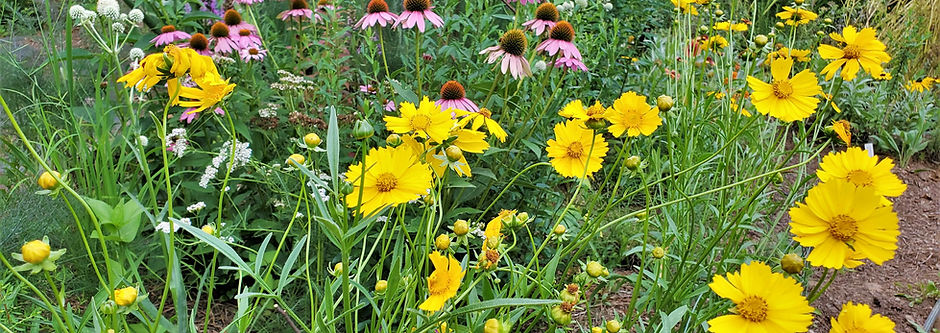Attend a Native Plant Seed Swap!
- ljmarkson
- Nov 21, 2023
- 3 min read
Updated: Nov 28, 2023
Native plants are a cornerstone of creating a habitat-friendly, sustainable yard for wildlife. They offer food, shelter, coverage, nesting material and nesting sites. If planted in similar conditions to where they would grow in the wild, native plants can be hardy, low maintenance, and save water usage. Native plants also create a dynamic and beautiful year-round landscape filled with life.

As interest in native plants as a primary landscape option grows native plant seed swaps are also popping up. In the future I hope to have a standalone seed collecting workshop and swap to contribute to a stronger local seed sharing culture, but for now I’m starting small by adding a native plant seed swap table at my upcoming winter sowing presentation about growing native plants from seed. A seed swap is a way to:
find locally grown seeds
get seeds native to your ecoregion
increase biodiversity by growing a wider variety of native seeds
save money
connect to and share ideas with other people growing native plants

The basic rules for a native plant seed swap are simple and pretty much the same everywhere
Bring only native seeds that grow in your ecoregion. You can look up the name of any seeds on the Prairie Moon Nursery site and they offer great information about all the seeds they sell including a map of where they would naturally grow. Other resources to figure out what is native to where you live include the National Wildlife Federation and your Native Plant Society.

Bring ethically sourced seeds. The growing popularity of native plants makes them at risk for being poached or overharvested in the wild. Taking any part of a native plant without asking on public or private land is not only unethical, but it can degrade the local ecosystem by harming the plant population.

It’s not okay to collect seeds (or plants!) in national, state, or local parks. In local parks there is often a team of dedicated volunteers and local organizations that have spent a great deal of time and money restoring the natural areas by removing invasives and adding back native plants that were propagated and/or donated. Taking seeds disrupts the restoration process. (video of an restoration park site in Atlanta)
Seeds ensure a plant remains in the area it is growing to offer food for the local wildlife. If you have permission to collect seeds or even if you are collecting in your own yard, the general rule is don’t collect more than 5% of the seeds from an individual plant or the population as a whole.

Do not collect or bring seeds of rare, endangered, or threatened native seeds. The native plant community is not about the kind of collector mentality that contributes to species loss. Organizations around the country like the Georgia Plant Conservation Alliance (GPCA) have created a network of dozens of non-profit organizations and private businesses to study and conserve vulnerable native plants. Reputable native plant nurseries that might have a rare native plant will be coordinating their efforts with others and not poaching or selling them just to make a profit.

Do not bring seeds from anywhere that pesticides have been used. No one wants plants or seeds with residual poison on them.

Include as much information as you can such as the common name (e.g. scarlet sage), scientific or Latin name (e.g.Salvia coccinea), the year and month you collected them (or the year you bought them), and anything else about the seeds or plants you can fit on an envelope.

If you’re in Atlanta on December 2, register for the winter sowing presentation (Here) and be part of the seed sharing movement. The swap will start after the presentation. If you already winter sow and only want to participate in the seed swap you still need to register – just send a note when you register that you’re coming for the swap and show up at 12:30.

The aim is to grow and share native plant seeds to suppor local biodiversity and habitat restoration, including yards. If you’re not in Atlanta, (or even if you are!) consider organizing a local native plant seed swap where you live!

Note: There are no affiliate links in this blog. Please click the highlighted text throughout the post for links to references, details, explanations, worthy organizations or businesses, or examples that I think might be helpful.


.jpg)
